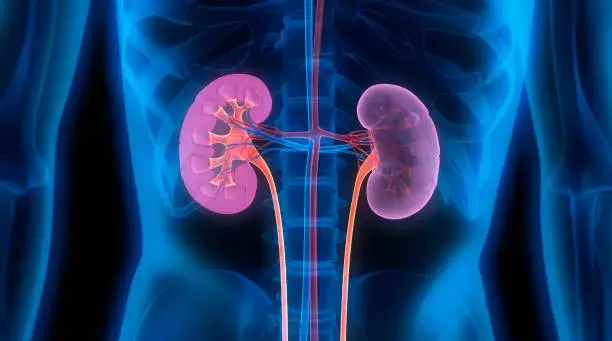- Home
- Medical news & Guidelines
- Anesthesiology
- Cardiology and CTVS
- Critical Care
- Dentistry
- Dermatology
- Diabetes and Endocrinology
- ENT
- Gastroenterology
- Medicine
- Nephrology
- Neurology
- Obstretics-Gynaecology
- Oncology
- Ophthalmology
- Orthopaedics
- Pediatrics-Neonatology
- Psychiatry
- Pulmonology
- Radiology
- Surgery
- Urology
- Laboratory Medicine
- Diet
- Nursing
- Paramedical
- Physiotherapy
- Health news
- Fact Check
- Bone Health Fact Check
- Brain Health Fact Check
- Cancer Related Fact Check
- Child Care Fact Check
- Dental and oral health fact check
- Diabetes and metabolic health fact check
- Diet and Nutrition Fact Check
- Eye and ENT Care Fact Check
- Fitness fact check
- Gut health fact check
- Heart health fact check
- Kidney health fact check
- Medical education fact check
- Men's health fact check
- Respiratory fact check
- Skin and hair care fact check
- Vaccine and Immunization fact check
- Women's health fact check
- AYUSH
- State News
- Andaman and Nicobar Islands
- Andhra Pradesh
- Arunachal Pradesh
- Assam
- Bihar
- Chandigarh
- Chattisgarh
- Dadra and Nagar Haveli
- Daman and Diu
- Delhi
- Goa
- Gujarat
- Haryana
- Himachal Pradesh
- Jammu & Kashmir
- Jharkhand
- Karnataka
- Kerala
- Ladakh
- Lakshadweep
- Madhya Pradesh
- Maharashtra
- Manipur
- Meghalaya
- Mizoram
- Nagaland
- Odisha
- Puducherry
- Punjab
- Rajasthan
- Sikkim
- Tamil Nadu
- Telangana
- Tripura
- Uttar Pradesh
- Uttrakhand
- West Bengal
- Medical Education
- Industry
Current definitions result in overdiagnosis of CKD in elderly, finds JAMA study

Chronic Kidney Disease definition not accounting for age-related GFR decline leads to systematic and widespread overdiagnosis of CKD in older adults, suggests a study published in JAMA Intern Med.
Using the same level of estimated glomerular filtration rate (eGFR) to define chronic kidney disease (CKD) regardless of patient age may classify many elderly people with a normal physiological age-related eGFR decline as having a disease.
A group of researchers from Canada performed a study to compare the outcomes associated with CKD as defined by a fixed vs an age-adapted eGFR threshold.
This population-based a cohort study was conducted in Alberta, Canada and used linked administrative and laboratory data from adults with incident CKD from April 1, 2009, to March 31, 2017, defined by a sustained reduction in eGFR for longer than 3 months below a fixed or an age-adapted eGFR threshold. Non-CKD controls were defined as being 65 years or older with a sustained eGFR of 60 to 89 mL/min/1.73 m2 for longer than 3 months and normal/mild albuminuria.
The follow-up ended on March 31, 2019. The data were analyzed from February to April 2020.
The primary outcome was Competing for risks of kidney failure (kidney replacement initiation or sustained eGFR <15 mL/min/1.73 m2 for >3 months) and death without kidney failure.
The results of the study are as follows:
- The fixed and age-adapted CKD cohorts included 127 132 and 81 209 adults, 36 627 men, respectively.
- The fixed-threshold cohort had lower risks of kidney and death than the age-adapted cohort.
- A total of 53 906 adults were included in both cohorts. Of the individuals included in the fixed-threshold cohort only (n = 72 703), 54 342 (75%) were 65 years or older and had baseline eGFR of 45 to 59 mL/min/1.73 m2 with normal/mild albuminuria.
- The 5-year risks of kidney failure and death among these elderly people were similar to those of non-CKD controls, with a risk of kidney failure of 0.12% or less in both groups across all age categories and risk of death at 69, 122, 279, and 935 times higher than the risk of kidney failure for 65 to 69, 70 to 74, 75 to 79, and 80 years or older, respectively.
Thus, the researchers concluded that this cohort study of adults with CKD suggests that the current criteria for CKD that use the same eGFR threshold for all ages may result in overestimation of the CKD burden in an ageing population, overdiagnosis, and unnecessary interventions in many elderly people who have an age-related loss of eGFR.
Reference:
Accounting for Age in the Definition of Chronic Kidney Disease by Liu P et. al published in the JAMA Intern Med.
doi:10.1001/jamainternmed.2021.4813
Dr. Shravani Dali has completed her BDS from Pravara institute of medical sciences, loni. Following which she extensively worked in the healthcare sector for 2+ years. She has been actively involved in writing blogs in field of health and wellness. Currently she is pursuing her Masters of public health-health administration from Tata institute of social sciences. She can be contacted at editorial@medicaldialogues.in.
Dr Kamal Kant Kohli-MBBS, DTCD- a chest specialist with more than 30 years of practice and a flair for writing clinical articles, Dr Kamal Kant Kohli joined Medical Dialogues as a Chief Editor of Medical News. Besides writing articles, as an editor, he proofreads and verifies all the medical content published on Medical Dialogues including those coming from journals, studies,medical conferences,guidelines etc. Email: drkohli@medicaldialogues.in. Contact no. 011-43720751


